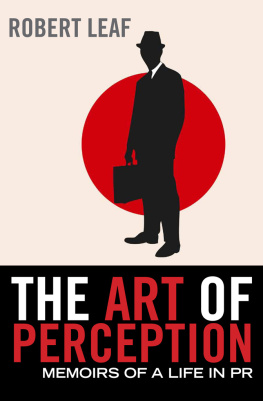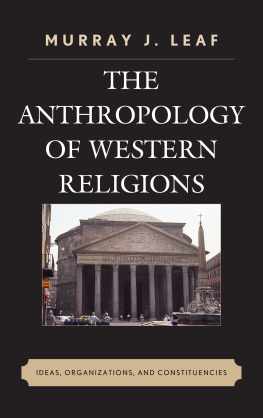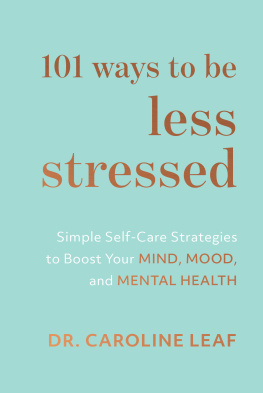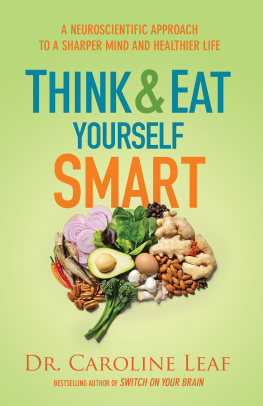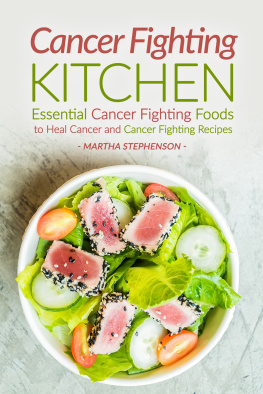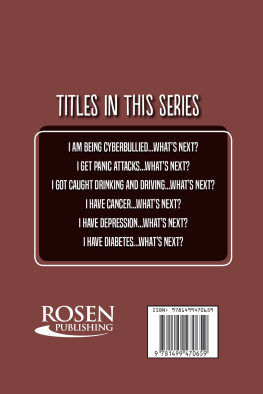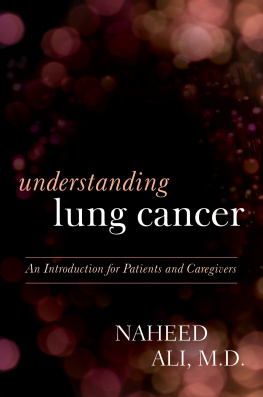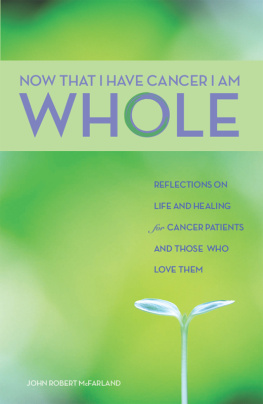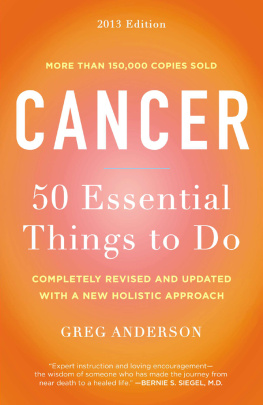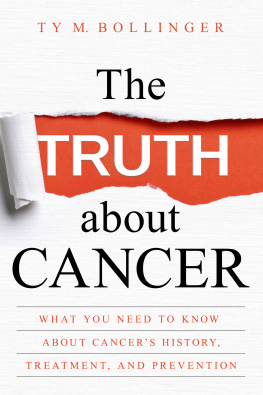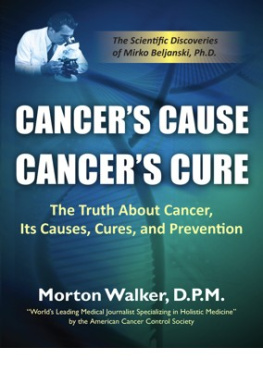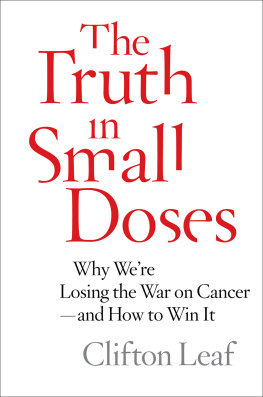Thank you for downloading this Simon & Schuster eBook.
Join our mailing list and get updates on new releases, deals, bonus content and other great books from Simon & Schuster.
C LICK H ERE T O S IGN U P
or visit us online to sign up at
eBookNews.SimonandSchuster.com
Contents
For Alicia and Sofia, the loves of my life.
Prologue
How Did We Get Here?
T wo years before I came to believe that we were losing the war on cancer, I had concluded that we were on the brink of victory. The notion had spun out of an extraordinary conversation Id had in February 2002 with Daniel Vasella, then the chief executive officer of the Swiss pharmaceutical firm Novartis. He was in New York for the World Economic Forum, the annual gathering of business titans, statesmen, movie stars, and savants traditionally held in Davos, a resort town tucked high in the Swiss Alps. But this particular winter, the first after 9/11, the gathering had moved to midtown Manhattan, and the forty-eight-year-old Vasella had settled into the lobby bar at the St. Regis Hotel for a string of interviews with the business press.
I was reluctant to join the line. It was late in the day, and I was sure I was in for a lengthy pitch on some revolutionary age-spot cream then in clinical trials, or a rundown of the companys ever-expanding portfolio of medicines. I was then an editor at Fortune and oversaw the magazines investing coverage, among other things, so such conversations were common. But this time the phrase drug pipeline was not uttered once. Nor was revenue stream. Nor share price. Vasella hardly mentioned his company at all.
Instead, he spoke about the anguish caused by endemic malaria, the soaring cost of prescription drugs, and the preventable diseases still plaguing half the world. His industry, he said with surprising candor, had not done enough to address these crises. He spoke of the challenges of innovation in a big corporation and of dismantling the walls of ancient corporate fiefdoms. (Vasella had helped engineer, in 1996, the merger of two century-old Swiss chemical companies, Sandoz and Ciba-Geigy, and had become CEO of the newly formed Novartis.)
As the conversation continued in the dim light of the hotel bar, the subjects grew more personal and raw, and dotted lines between our histories emerged. Vasella spoke of his older sister Ursulas battle with Hodgkins disease, a cancer of the lymph system, and of watching her waste away during a grueling three-year fight. Vasella was ten at the time of her death; she was eighteen.
I too had struggled with Hodgkins (at age fifteen), but had survived thanks to a unique chemotherapy regimen that had been pioneered at the National Cancer Institute (NCI) a decade or so prior to my diagnosis in 1978. The discovery had, unfortunately, come a few years too late to save young Ursula.
An uncannier connection was Vasellas work in the late 1980s. In his first managerial job at a pharmaceutical company, he was responsible for an obscure injectable drug, somatostatin, that was shown to relieve some of the worst symptoms of carcinoid syndrome, a rare intestinal cancer. My mother had been one of the few people in the world to rely on the drug, which had alleviated some of the daily diarrhea and near-constant skin flushing that made her disease so debilitating. Like Vasellas sister, she would eventually succumb to her cancer, in 1995.
Vasella had been surrounded by illness and tragedy as a child. At the age of five, his asthma grew so severe during the summer months that his parents sent him to live on a farm in the mountains, away from the family. When he was eight, a bout with tuberculosis, followed by meningitis, forced him to spend a full year in a hospital and sanatorium. Five years later his father, a history professor, died of complications from surgery. Then a second sister died as well, from a car accident.
Vasella related only a tiny portion of this story as we sat with our Scotches in the hotel bar.
He had gone to medical school, received his degree, and practiced medicine in Bern, Switzerland, before giving it up for a junior marketing position at Sandoz. Six years later he was in the corner office. Among the chief executives of major drug companies, Vasella was the only physician, the only one who had ever taken care of patients.
A few journalists would later venture that it was this clinically trained eye that helped him see the vast potential of the leukemia drug called Gleevec, which many oncologists were then hailing as a genuine breakthrough and as a model for cancer therapy in the generation to come. Others involved in the drugs development would give Vasella far less credit. I knew none of this at the time.
What I did know, what I could hear in our first conversation, was how Vasella spoke of the drug, which had been approved by the Food and Drug Administration just nine months earlier. He spoke the way a first-time parent speaks about his childs first recital.
Gleevec worked, he explained, in a radically new way: by homing in on a mutant protein found in the white blood cells of patients with an uncommon form of leukemia. This aberrant protein, created as the result of a genetic glitch, relayed instructions that sent those white blood cells into a continual replicative loop. They divided and divided until eventually they crowded out every other type of cell in the blood, and the patient died. Novartiss remarkable molecule blocked that protein from passing along its deadly message. And it was so precisely aimed that, even as it shut down the mutants, it spared the healthy cells around them. (Traditional chemotherapy, by contrast, is a sledgehammer: it decimates many normal cells as it strikes the malignant.)
Gleevec, said Vasella, had established the principle of targeted cancer therapy. Now it was only a matter of time until scientists designed molecules to disable the wayward signaling mechanisms central to every cancer.
As dramatic and exciting as the story line was, I failed to grasp its significance. Over the next few months, Vasella and I spoke again and again, but little about cancer. Our sprawling conversations focused on the challenges of running an enormous global company, the unyielding pressure from Wall Street, and the unexpected crises of confidence that leaders facesubjects closer to Fortune s editorial focus. (He and I turned the interviews into an essay for the magazine, entitled Temptation Is All Around Us, in which Vasella thoughtfully, and forthrightly, bared some of his driving fears and desires.)
As for the revolution then going on in cancer therapy, I did not think about it again until another drug company CEO, Sam Waksal, was in the news. Waksal had founded, with his brother Harlan, a small biotech company called ImClone, which also had a targeted cancer medicine in development.
Sam Waksal was the anti-Vasellaa showman and socialite famous for hosting lavish, celebrity-brimming parties at his art-filled SoHo loft, as New Yorks gossip pages put it. In 2001, he made tens of millions of dollars cashing in ImClone stock, which had soared on rumors of the imminent approval of the companys cancer agent. Like Gleevec, this new molecule was designed to interrupt the growth signaling of a specific protein.
ImClones experimental agent, soon to be known as Erbitux, operated by way of a different mechanism: a biological one. Unlike traditional chemistry-based drugs, Erbitux was an antibody, one cultivated in the living factories of cultured cells. Conceived by a well-respected cancer researcher at Houstons MD Anderson Cancer Center, the molecule had been in the making for some twenty years. And by late 2001, at long last, it looked as if the agent would be approved by the Food and Drug Administration.



